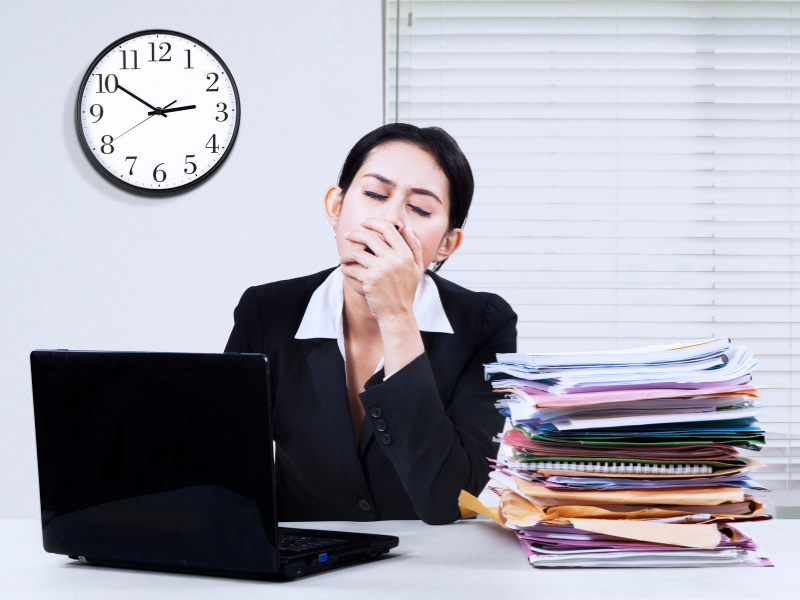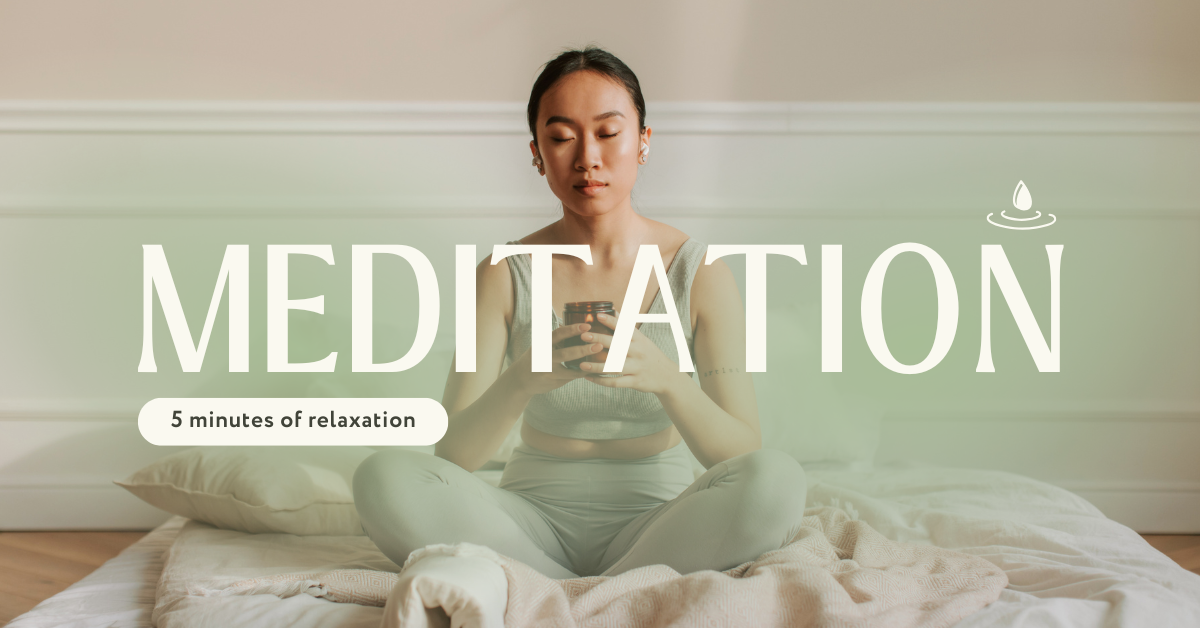Have you ever closed your laptop at the end of the day feeling completely drained out, even though you barely moved from your chair? That’s not physical tiredness, it’s your brain waving a red flag of mental overload. When endless meetings, messages, and decisions pile up, your mind runs in overdrive, leaving you foggy and emotionally spent.
That’s where meditation for mental exhaustion comes in. It’s a simple yet powerful way to calm your thoughts, clear mental clutter, and restore focus. Even a few mindful minutes can recharge your brain, the same way rest refreshes your body.
In this guide, we’ll explore why your mind feels overworked and how consistent meditation can help you regain energy, clarity, and balance in your everyday routine.
What Is Mental Exhaustion (and Why It’s Different from Physical Fatigue)?
Mental exhaustion happens when your brain keeps running under constant pressure, long hours, emotional strain, or nonstop decision-making. Over time, your mind starts to slow down, making it hard to think clearly, stay focused, or feel motivated.
Unlike physical tiredness that goes away with rest, mental fatigue runs deeper. Even when your body feels fine, your thoughts can still feel heavy and drained, like your brain is out of fuel.
You might wonder, can stress and anxiety make you tired? Yes, when stress hormones stay active for too long, they drain your mental energy and emotional balance. That’s also why anxiety makes you tired, because your brain stays alert even when there’s no real reason to worry.
This ongoing strain often leads to directed attention fatigue, where your brain’s focus system becomes overloaded. As a result, even simple daily tasks start to feel mentally exhausting.
Signs You’re Emotionally and Mentally Drained Out
Feeling drained out doesn’t always mean you’ve been physically active. Sometimes, it’s your brain struggling under mental overload. You might notice your energy fading, motivation dropping, and even simple tasks feeling heavier than usual.
Here are some common signs your mind is asking for rest:
- Constant tiredness: You wake up tired and feel exhausted no matter how much you sleep.
- Lack of focus: Your thoughts wander, and staying productive feels impossible.
- Low motivation: Even easy tasks seem like too much effort.
- Irritability: Small things suddenly feel overwhelming or frustrating.
- Emotional detachment: You feel disconnected from people or activities you used to enjoy.
If you’re too tired to even enjoy your evening, that’s your mind quietly asking for a break , not your body. Recognizing these signals early helps you pause before exhaustion turns into burnout.

How Meditation Helps Relieve Mental Fatigue?
When your mind feels foggy or overstimulated, meditation acts like a reset button for your brain. It helps you recover from directed attention fatigue, which happens when your brain’s focus system becomes overworked from constant concentration and stress.
Here’s how meditation for mental fatigue restores your energy and balance:
- Rest and Reset Your Brain: Meditation gives your mind the quiet time it needs to slow down racing thoughts, helping you regain focus and ease tension.
- Lower Stress Hormones: Research shows that meditation can reduce cortisol levels, the stress hormone responsible for mental strain allowing your body and mind to relax naturally.
- Boost Clarity and Calm: When you meditate regularly, your brain activity shifts from stress-related areas to regions linked with calmness and decision-making, helping you think clearly and stay emotionally steady.
- Build Mental Strength: Over time, consistent meditation practice improves your brain’s resilience, making it easier to handle pressure, focus longer, and stay centered even on busy days.
By taking just a few mindful minutes daily, you allow your brain to recover from mental overload and function with greater clarity, calm, and control throughout the day.
Meditation for Emotional Exhaustion and Anxiety
When constant stress or overthinking drains your energy, emotional exhaustion can leave you mentally and emotionally empty. Practicing meditation for emotional exhaustion helps you pause, breathe, and reset your focus. With every mindful breath, your body relaxes and your thoughts begin to settle, supporting natural mental recovery.
Quick Guided Meditation for Anxiety
If anxiety adds to your fatigue, try this simple guided meditation for anxiety at your desk: close your eyes, breathe in for four counts, hold gently, then exhale for six. Feel your shoulders soften and your body supported by the chair. Repeat for a few rounds to calm your mind and release tension.
Even a few minutes of mindfulness can reduce stress and help you feel lighter, reminding you that your mind needs rest and care just like your body.

Mindfulness Techniques for Busy Professionals
When your schedule is packed and your mind feels pulled in a dozen directions, it can seem impossible to slow down. But mindfulness doesn’t require hours of silence or special settings, it’s about finding stillness right where you are. These mindfulness techniques for busy professionals fit naturally into your daily routine, helping you recover from meditation for mental exhaustion and stay grounded throughout the day.
1. 5-Minute Breathing Sessions
Take a short pause between tasks and focus only on your breath. Take a slow, steady breath in, let it settle for a second, then gently breathe out to release the tension. This quick reset clears your head, calms your nerves, and improves focus before your next meeting or decision.
2. Mindful Walking
Instead of scrolling through your phone on your break, take a slow, intentional walk. Notice your steps, the sound of your surroundings, and how your body feels. Even a few minutes of mindful walking can recharge your energy and ease tension.
3. “Pause and Breathe” Breaks at Work
Whenever you feel pressure building up, before replying to an email or joining a call, pause for a few deep breaths. These small moments of awareness help prevent burnout and keep you emotionally steady.
Pro Tip: Use gentle reminders or mindfulness apps to prompt mini breaks during your day. Even short check-ins like “take one deep breath” or “relax your shoulders” can make a huge difference in keeping you balanced and calm.
How to Build a Meditation Habit That Actually Sticks?
I still remember when I first tried meditating. I sat down, closed my eyes, and within 30 seconds, my mind was already thinking about emails, to-do lists, and dinner plans. It felt impossible to focus. But over time, I realized that meditation isn’t about shutting your thoughts off; it’s about learning to sit with them calmly. And once I accepted that, everything changed.
If you’ve been struggling to make meditation a part of your day, you’re not alone. Building a habit takes patience, but it’s completely doable, even if you only have a few spare minutes. Here’s how you can start in a way that actually sticks:
- Start small: Begin with just 2–3 minutes. Even a short pause can ease mental fatigue and help you recharge.
- Pick a consistent time: Morning or night, stick to the same time daily so it becomes your moment of calm.
- Don’t fight your thoughts: Your mind will wander, and that’s okay. Just acknowledge the distraction and gently bring your focus back to your breathing.
- Create gentle reminders: A sticky note or calm phone alert can nudge you to pause and breathe mindfully.
- Celebrate your effort: Even two minutes of stillness counts. Every small session brings more peace and clarity.
Meditation isn’t about escaping your thoughts; it’s about learning to meet them with calm awareness. The more you show up for those quiet moments, the more you’ll notice how your mind slowly becomes clearer, lighter, and kinder to you.
Quick Ways to Recharge When You’re Drained Out (Beyond Meditation)
Sometimes, even with meditation, you still feel completely drained out, like your brain just can’t take in another thought. That’s your mind’s way of saying, “I need a real break.” The good news? You don’t need a full day off to reset. A few small habits can bring your energy back fast and ease mental overload.
Here are a few quick ways to recharge when you’re feeling mentally spent:
- Drink water: Dehydration quietly drains your focus. A glass of water can instantly refresh your mind and body.
- Take screen breaks: Step away from your phone or laptop every hour. Even a two-minute pause gives your eyes and mind a chance to reset.
- Stretch or move: Gentle movement boosts blood flow and clears the mental fog that builds up after sitting too long.
- Power nap: A 10–15 minute nap can do wonders for alertness and energy without making you groggy.
- Jot it down: Journaling helps release mental clutter. Writing your thoughts out gives your brain breathing space.
These tiny resets might seem simple, but when paired with meditation, they make recovery even more powerful. Together, they help you manage stress, prevent burnout, and bring your mind back to a balanced, calm state, similar to other small stress relief techniques busy professionals can try throughout the day.

Conclusion
Meditation for mental exhaustion isn’t about sitting perfectly still, it’s about giving your mind the space to breathe, reset, and recover. Even a few mindful minutes a day can help busy professionals regain focus, boost energy, and feel more centered amid daily chaos. Pair it with small recovery habits like short breaks, hydration, and gentle movement, and you’ll notice your mental recovery getting stronger with time.
Start today. Take one mindful breath, one short pause, and let it be your moment to recharge.
Frequently Asked Questions (FAQs)
Is mental exhaustion the same as physical exhaustion?
No, they’re different. Physical exhaustion comes from overusing your body, while mental exhaustion happens when your brain is constantly active or stressed. You might feel tired even after resting because your mind, not your muscles, needs recovery time.
Can meditation help with mental exhaustion?
Yes. Meditation for mental exhaustion helps calm your thoughts, lower stress hormones, and restore focus. Even a few minutes of mindful breathing can recharge your brain, ease tension, and support better mental recovery over time
What is the best treatment for emotional exhaustion?
The best approach combines rest, mindfulness, and self-care. Meditation, journaling, short breaks, and gentle movement all help release built-up stress and emotional fatigue, giving your mind the space it needs to heal.
How long does it take to recover from mental exhaustion?
Recovery time varies from person to person. With daily meditation and mindful habits, many people start noticing improvements in clarity, mood, and focus within a few weeks. Consistency is key to long-term mental balance.




